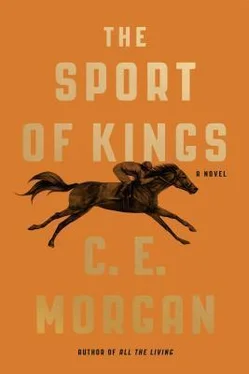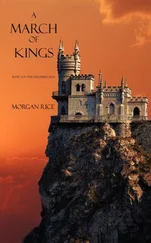So he quit sleeping alone in the back room at the Osbourne house, took his sleeping bag up to the stallion barn, and bedded down in the tack room under a peg rack of saddle blankets, surrounded by the stamping snorting urinating sound of animals. It reminded him of minimum, where fifteen men slept in one room. He stayed there, because he needed his rest. More: he needed his wits if he was going to plunge his hands into the white world, if he was going to learn to draw up their rivers of wealth and drink it, like he’d seen a crazy nigger in the pen do — slit the throat of a white dude and opened wide his mouth to catch the blood spurting from his artery. He could think of that now without shuddering, because
There were stars overhead, but he wasn’t looking up.
There were graves under his feet, but he wasn’t looking down.
The mask looks straight ahead. Don’t forget to forget.
He spent those first months in prison rearranging the components of his face so it looked like a man’s and could not cry any longer, then the body froze to match his face, hardened by the cold that comes when grief itself dies. His body survived that first year inside, but that brought no relief, because the mind was still alive and spawning thoughts like cockroaches. Real survival is learning to misremember disremember unremember everything as you follow orders, scramble, bargain, fight. Especially fight. Survive by any means necessary and just deal with the shame, because they left you no other choice. So what if your own heart bled out over time? Eventually, when they sent him across state to minimum, emotion was nothing but a long-dead sensation of a long-dead body. Then they told him that he could rub horses, pull himself up by his bootstraps, distinguish himself, play the sport of kings. He wasn’t naïve or romantic, he saw through it pretty quickly: horse is just a different kind of drug, horse is heroin. See, the rich hustle too, but they think their gambling is just a game without real consequence. He, however, would go in with his eyes open. So he read everything he could get his hands on, he studied hard, and then they selected him, because he alone knew the difference between hot and cold horses, snaffle and spoon bits, the Byerley Turk and Godolphin Arabian. He knew the meaning of prey animal.
The first day of his life was February 14: They led them all out to the barns in pairs like animals to the ark, the old cooled-down hats and Allmon, the youngest, now twenty-two. A white man was standing there, an ex-trainer, with a massive chestnut on a lead, a reschooled Thoroughbred. The man’s words were the first words of Allmon’s life:
“Happy Valentine’s Day, gentlemen, and welcome to the first day of Thoroughbred boot camp. If you’ve made it into this program, that means your correctional officers, as well as the committee of the Groom Program, believe you’ve shown potential and enthusiasm for this line of work. You’re one of the chosen. Let me be very clear: We don’t care what you did to get incarcerated. We only care how you’ve conducted yourself inside thus far. You will be released from Blackburn in about six months, and, in order to prepare you, the next half year of your lives will be devoted to everything equus — their history, grooming, and feeding, their care on and off the track, basic vet science.
“Gentlemen, the hundred horses in this program come from all over the country; we have claimers who’ve put on two hundred pounds since they arrived, we have your second-tier racers that were made to run on broken knees and bowed tendons, we have some graded stakes winners, whose names you’ll be familiar with if you read the Racing Form . The one thing they all have in common is they were purchased out of the auction bin, headed for slaughter. About a hundred thousand horses are slaughtered in this country every year. They breed Thoroughbreds to the tune of thirty thousand a year, so for every stakes winner there might be two hundred draggers who get shipped off to the meat house when they can’t earn their keep on the track. What happens is they slam a four-inch nail into their foreheads to knock them out, then they hoist them up by a rear leg and cut their throats, bleed them out. I want you to keep that in mind while you work with these horses — you’re here in a life-saving capacity. Being a groom is a special vocation. The breeders are breeding bigger horses on weaker legs, the owners rarely live around the horses and most are in it for the money or the bragging rights, the trainers and the vets are shooting them up with drugs and running them injured, and the jockeys are making big bucks on their backs. You’ll hear all of them say they love horses, but as far as I’m concerned, the only ones who earn the right to say that are the grooms. You feed a horse, you brush a horse, you pet a horse, then you can say you love it. We have an old saying in this sport: Treat your horse as your friend, not as your slave. That’s what I’m talking about. Now come on up here and meet your first horse.”
Allmon, when you walked up to that gelding, your heart was banging in your ear, sweat streamed into your eye, your hands were shaking in front of God (the great nothing) and everybody when you grazed the horse on his muzzle, just barely. Then, digging deep for whatever boldness you possessed — the thing that got you through — you placed both palms on the flats of that long face. The horse jerked smally, as if startled, then released a long, ruffled breath and lowered its head like it was bowing to you.
And the trainer said, “Well, hey, kid. That’s a nice touch you got there.”
Inch by inch, day by day, you learned to master your fear of the animal. First you took up the currycomb and rubbed the horse from the massive shoulder around, tracing circles and trying not to leap out of your skin the first time you passed the rump of the horse with its jackhammer legs. You used the dandy brush to raise whirlings of dust and swipe the fields from its hide. Then you took a girl’s brush to the mane and tail, a dollop of ShowSheen, and a braid. You learned to scrape deep into the hooves with a question pick and to bathe the horses with a soapless wash to preserve the skin’s oils, to dab balm on hock scratches and check teeth between dental exams. You wrapped swollen fetlocks in blue bandage and disinfected tools in antiseptic. Then, finally, they were hoisting you up on the animals; you, a city kid from a forgotten life, now a horseman. More than that, they were calling you a groom, even calling you gifted, telling you what you could have if only you wanted it bad enough. Which you did. You were a man apart, not like these others, who were just looking for the simple and steady. The future came and wrenched open your eyes when you were just a kid, and once your broken eyes healed, the only thing you could see was: horse.
On the last day, three weeks before your release, that trainer — the one who’d been watching you for six months, took you aside and said, “Allmon, you continue to impress me. You’ve got good hands, some real talent. What do you intend to use it for?”
You say, “Do my thing.” It’s nobody’s fucking business how you intend yourself.
But he says, “I’ve got a feeling you’re looking for more than that. You feel like you’ve got something to prove?”
Quiet and steely a moment. Then you turn on him, on that white man who doesn’t know you, doesn’t know who you are, what you’re capable of. Whatever’s in your eyes must burn too bright, because the man rears back a little. “Yeah, I got something to prove. I ain’t asked to be here, but here I am. And now I aim to play the man’s game better than he can play it. I aim to make something of myself.”
The trainer doesn’t say anything for a moment, just looks at you, very quiet and evaluating. Then: “So I’m going to offer you some advice. As someone who was inside.”
Читать дальше
Конец ознакомительного отрывка
Купить книгу












